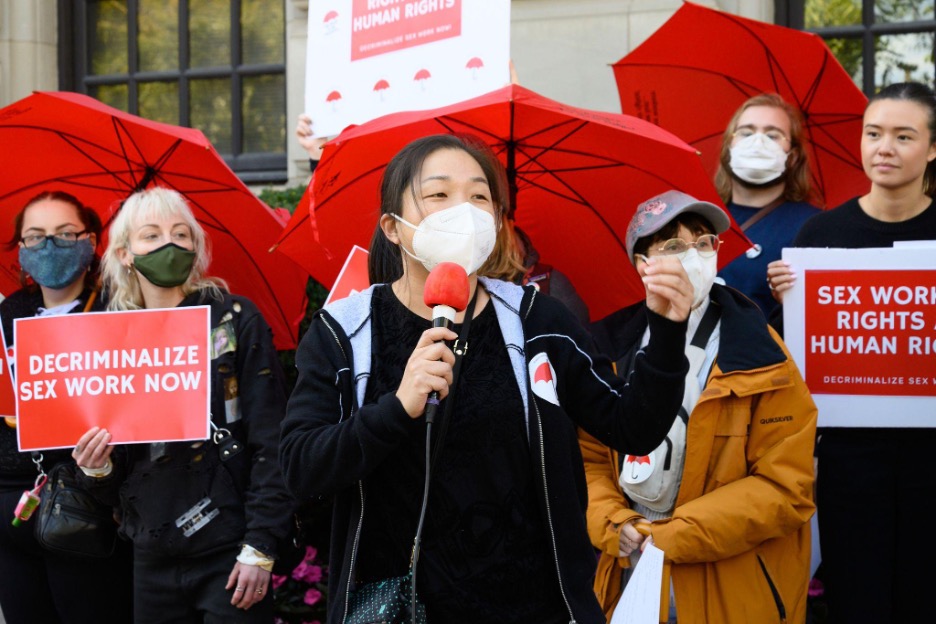The Canadian Alliance for Sex Work Law Reform is vowing to continue the fight against Canada’s sex-work laws, saying that they plan to elevate their case all the way to the Supreme Court of Canada if needed after a Toronto judge Monday ruled that the nation’s criminal laws on sex work are constitutional.
On Sept. 18, Justice Goldstein of the Ontario Superior Court struck down a constitutional challenge of the 2014 Protection of Communities and Exploited Persons Act (PCEPA) in a 150-page decision, sustaining that PCEPA does not criminalize sex workers nor violate any constitutional rights.
Advocacy groups say the ruling means that sex workers, especially immigrants and migrants, will continue to be endangered and victimized.
“The decision is deeply disappointing to read, but at the same time, it’s also not surprising,” says Mina Do, an organizing member of Butterfly.
“The court is too steeped in stigma against sex workers to listen and believe the voices of workers and organizations who have been working with the most impacted.”
Butterfly, a Toronto-based organization with over 10 years of experience supporting Asian and migrant sex workers, says PCEPA isolates workers from support systems while simultaneously allowing for police surveillance and criminalization of the industry.
“We see, behind the scenes, who is being targeted here,” Do says. “We see who is being deported.”
Understanding the challenge
The constitutional challenge was launched by Canadian Alliance for Sex Work Law Reform (CASWLR) in March 2021 on grounds that PCEPA puts sex workers at risk and violates their human rights to bodily autonomy, safety, security and equality. This is the most significant legal challenge since the 2013 Bedford case.
Vincent Wong, the legal counsel for intervenor group the Migrant Workers Alliance for Change, says the court sidestepped their submissions about worker’s lived experiences.
“It’s a masterclass in erasure, dismissal and infantilization,” he says of the ruling. “There’s very little consideration to migrants or anyone with precarious status.”
Jenn Clamen, CASWLR’s national coordinator, says the decision treats sex workers as though they don’t know or understand the laws, ignores the relationship between stigma and violence against workers and makes the false claim that CASWLR wants a constitutional right to buy or sell sex.
“We’re asking for our constitutional right to bodily autonomy, safety, security and equality,” she says.
The former federal Conservative government based PCEPA on the ‘Nordic Model,’ which theoretically criminalizes purchasers of sex but not the workers themselves. However, advocates say making one part of the industry illegal affects the whole sector, and the third-party laws criminalizing those who profit off sex besides workers, like the translators, security guards and drivers, is especially harmful.
“For Asian migrant workers, third parties are crucial support systems,” says Butterfly executive director Elene Lam.
Butterfly is currently working with a member who was arrested, charged and placed in prison under this law for helping her friend with phone calls and translations.
Do says migrant and sex worker communities need their own ways of mutual aid and collaboration, but this is often intentionally misinterpreted by police as exploitative. If charged for sex work, immigrant and migrant sex workers face deportation under the Immigration and Refugee Protection Regulations (IRPR).
Studies have found that immigrant and migrant sex workers often engage in riskier sex acts because they have a lack of citizenship rights and security. Research also shows that many workers fear the police because their work is criminalized, so they won’t report abuse.
In 2018, Butterfly filed a brief to the House of Commons to remove the IRPR provision allowing the deportation of temporary residents if they enter work that “offers striptease, erotic dance, escort services or erotic massages,” but the law remains.
“It’s always the most marginalized being abused, and that disgusts me,” says Jelena Vermilion, executive director of SWAP Hamilton. “Immigrant and migrant sex workers are being targeted for helping each other.”
Historical continuity of dismissal
Wong says the decision shows a pattern of excluding migrant sex workers from society stemming from the first race and gender-based exclusion in Canadian immigration law, the 1885 Chinese Immigration Act, where section 12 specifically addresses Chinese prostitutes.
“Asian migrant sex workers have always been essentially Canada’s anti-citizen,” he says. “They’ve been deemed excludable, deportable, and their human rights don’t matter. This decision is a legacy of that.”
Do says she was hopeful for change when she attended the 2013 Bedford case, but PCEPA was a major step backward.
Vermilion attended the five-day hearings in October 2022 at the start of the constitutional challenge, and she says it was a disturbing experience. “It’s just damaging to hear the government argue against your safety, against your life.”
Wong adds the court repeatedly sides against the advocates, submitted research and sex workers when there’s conflicting views to diminish their evidence, referencing the dismissal of Lam’s affidavit.
“Instead of exploring why that difference might be, Justice Goldstein simply takes the side of the police officer and infers that Ms. Lam was lying,” he says. “He blocks out all of Butterfly’s evidence so he doesn’t have to take a look at it.”
What next?
“The decision excludes those who live with precarious status, so the harms are compounded with existing vulnerabilities,” Wong says.
Lam agrees. “The conflation of sex work and human-trafficking denounces agency,” she says. “This results in immigrant and migrant sex workers being continuously harassed by police, especially through raids.”
The current sex work and human trafficking laws exacerbate tensions between police and immigrant and migrant communities, so Lam says changing the laws are fundamental to every aspect of safety and trust.
“The constitutional challenge gave our community a hope for a chance to show the injustice,” Lam says. She calls for the public to learn more about the harms of criminalization, solidarity among feminist and violence against women organizations and continuing the campaign for status for all.
“We can’t win alone,” she says.
Since they began the constitutional challenge, CASWLR plans to take this to the Supreme Court, just like the Bedford case, and Clamen says they are prepared for the long haul.
“People are starting to see what’s really going on here,” Do says. “This keeps me hopeful because our own communities, migrants, particularly Asian workers, have been considered these voiceless victims in need of rescue for a long time.”
“We’re going to continue this fight. Sex workers’ rights are human rights.”
Angel Xing is a journalist and graphic artist born in Lanzhou, China, based in Ottawa and Toronto. She strives to create accessible narratives through multimedia storytelling, focusing on under-represented communities. Currently, she is finishing her undergraduate degree at Carleton University, studying journalism and humanities with a history minor.


